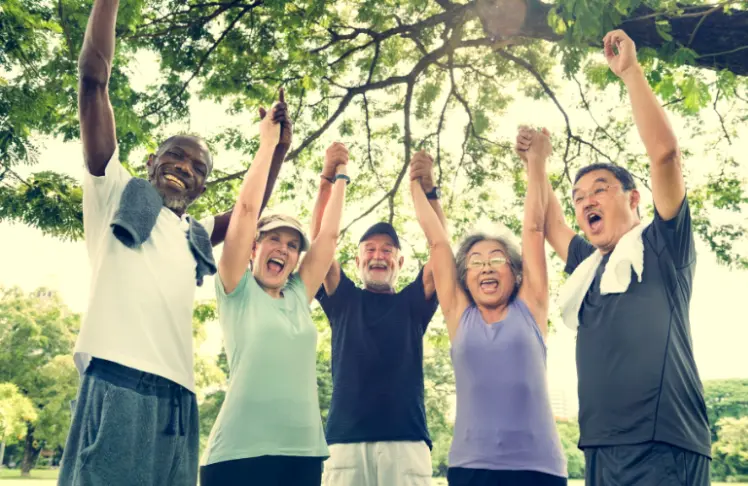Active Aging Presented by Public Health Seattle-King County
Staying mentally and physically engaged is essential for healthy aging. Pursuing hobbies has positive impacts on the mental well-being of adults over 65, according to a study published in Nature Medicine.
Mind-engaging hobbies not only decrease depression and reduce loneliness, but they also enhance knowledge, fulfill dreams, provide social opportunities, and most importantly, they promote a profound sense of mental well-being and accomplishment.
Hobbies that include physical activity help improve balance, coordination, flexibility, stamina, and strength.
These fun hobbies help active agers stay mentally sharp and physically fit.
Hobbies That Engage Your Mind
Participating in mentally stimulating hobbies exercises the brain, sharpens the mind, and helps combat cognitive decline. Here are some fun, mentally engaging hobbies for older adults.
Solving Puzzles
Whether you enjoy crosswords, sudoku, word finds, or building jigsaw puzzles, solving puzzles engages your mind. Doing puzzles promotes brain health, reduces the risk of dementia, and improves memory, according to the Mayo Clinic.
Drawing or Painting
Artistic expression has therapeutic benefits for people of all ages. Drawing and painting promote self-expression, reduce depression, and improve cognitive function in older adults, according to a Healthcare (Basal) journal report.
Joining an art class also provides social opportunities and the chance to learn a new skill.
Writing and Journaling
Writing is another form of creative expression that engages the mind. It stimulates creativity and imagination, requires critical thinking, and requires focus. Journaling also helps sharpen memory and process emotions.
Learning a New Language
Learning a new language is a fun way to expand your knowledge and skillset later in life. It enhances your memory and utilizes problem-solving skills. A study in the Frontiers in Aging journal shows that language learning also boosts cognitive functions and can delay dementia onset.
Playing Strategy Games
Playing strategy games like chess, poker, and Monopoly offers a fantastic opportunity for social interaction and exercise your strategic thinking skills. They also require focus, planning, problem-solving, and critical thinking skills. Your brain will get a workout as you plot to defeat your opponents.

Hobbies Involving Physical Activity
Staying physically active is a critical part of maintaining your health as you age.
Before you embark on any physical activity, though, consult your doctor to discuss any physical restrictions and medical guidance.
Pursuing a hobby that involves moving around is not just a way to make physical activity fun; it’s a thrilling adventure. These hobbies can get you moving and bring a smile to your face.
Gardening
Whether you have a green thumb or are a beginner, gardening allows you to get some physical exercise. At the same time, you plant, maintain, and harvest your garden. It also allows you to spend some time outdoors to enjoy some fresh air and watch your garden grow.
Birdwatching
There’s nothing more refreshing than enjoying time in nature. Birdwatching involves walking and hiking to find and observe birds in their natural setting.
According to National Geographic, research estimates there are between 50 billion and 430 billion birds on Earth. So, you have numerous types of feathered friends to find.
Plus, if you join a birdwatching club or go on a birdwatching vacation, you can meet and make new friends who share a common interest. It’s a beautiful way to stay connected and feel a sense of belonging.
Yoga
Yoga combines breathing techniques with physical exercise and has many benefits, according to the Mayo Clinic. It promotes relaxation, reduces stress, and relieves aches and pains. It also improves balance and flexibility.
Plus, you can do yoga with a group, on your own, watch a video, and even sit in a chair.
Traveling
Traveling involves going out with a tour group, friends, or family members. It opens the door to a wealth of new experiences.
Seeing new places and experiencing diverse cultures broadens your knowledge and cultural awareness. Taking tourist excursions in various cities and countries keeps you physically active and enables you to meet new people.
Swimming
Swimming is a fantastic, low-impact exercise because you are weightless in the water. It’s easier to move your limbs, and there is less impact on your joints. According to the Cleveland Clinic, it’s a great exercise option for people with arthritis and reduced mobility.
Swimming also provides cardiovascular exercise, burns calories, and builds muscles. You can swim indoors at a public or private pool or spend a day on the lake or beach.
Participating in any of these hobbies in retirement can help sharpen your mind, strengthen your body, offer a terrific recreational pastime, increase social interactions, and improve your quality of life.
















